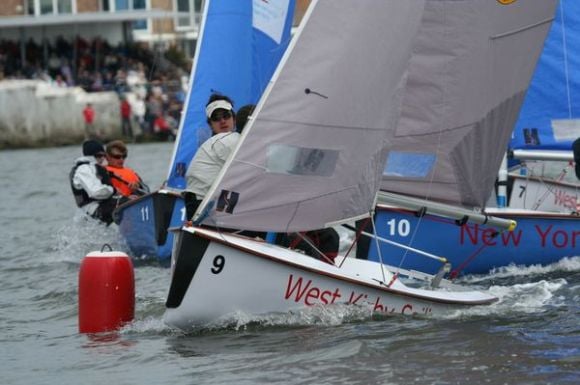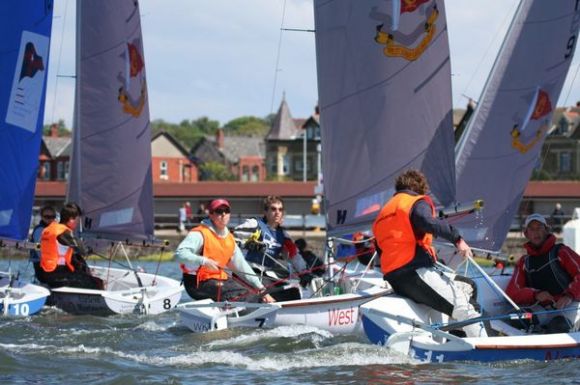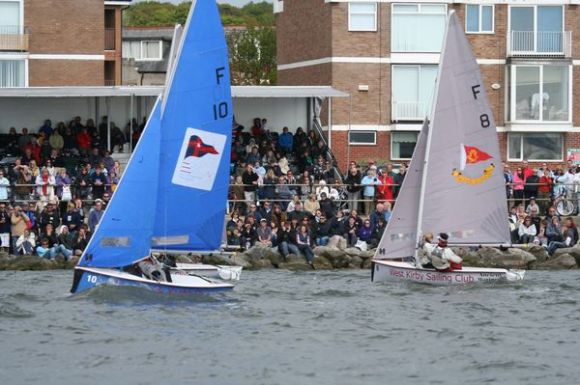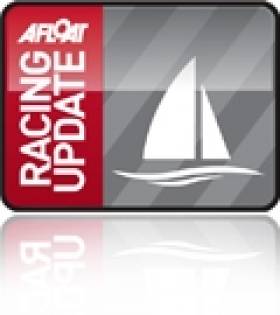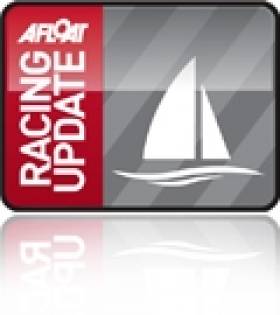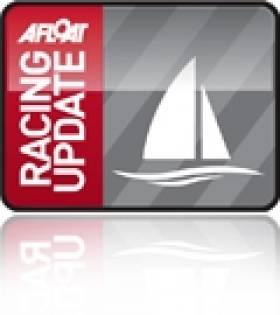Displaying items by tag: Team Racing
Irish team take Cumberand Cup
A Royal St George YC team have taken the prestigious Cumberland Cup over the weekend after a near-flawless series of racing. The team went into the final stages without dropping a single race, and claimed what's thought to be the oldest trophy in sailing for Ireland. The event was sailed in J80s on Queen Mary SC's reservoir, starting on Friday after a royal reception in St James' Palace on Thursday night.
Royal Thames YC has yet to provide any details on the week's racing but we'll have more from the team later in the day. More here now.
RSGYC take on Cumberland Cup
A Royal St George YC team will be the sole Irish representatives at the Royal Thames YC Cumberland Cup, the oldest perpetual trophy in yacht racing, with racing kicking off today at Queen Mary SC. The event is a two-boat team racing event sailed in J80s with the home team, Royal Thames, the current holders. The RSGYC team, headed up by John Sheehy and Nick Smyth, will face off against teams from Australia, Monaco, Germany, Australia, New Zealand and the USA. The Cumberland Cup dates back to 1775 and was established some 76 years before the America’s Cup
Two-boat team racing is best known in Ireland through the 'random pairs' format, where the team with a boat in last place loses the race. The result is highly tactical and combative, aggressive sailing, with the final beat to the finish line becoming particularly frantic.
Sheehy and Smyth come off a weekend that saw the pair finish in the last eight at the presitigous Wilson Team Racing Trophy in West Kirby SC, and Sheehy is also Ireland's top-ranked match racer at present.
Racing kicks off this morning, and you can catch some glimps of the action on the reservoir on their website's live webcam.
Two RSGYC teams in Wilson last eight
Two teams from the Royal St., George YC in Dun Laoghaire made it to the last eight of the 339-race Wilson trophy after 20 rounds of competition at West Kirby Sailing Club this weekend. It is the 16th appearance for the club at the UK event. Both the George Knights, (John Sheehy/Noeline Morgan, Nick Smyth/Rach Macmanus and Ger Owens/Melanie Morris) and another Royal St George team (Marty O'Leary/Brian Fenlon, Sam/Rachel O'Brien and Jonny O'Dowd/Rachel Guy) reached the quarter-final stage and pushed their quarters to the third race of the best-of-three, but failed to progress.
The final day of the 2010 Wilson Trophy dawned beautifully bright and clear and following a brief delay to allow the wind to build strength and stabilise direction, racing for the final part of the round robin element got underway. At this stage in the competition, every point counted for those teams hoping to make into the final eight and with a gaggle of teams mathematically capable of progressing to the next round, many of the matches understandably developed into full pitched battles.
American visitors Team Extreme continued where they had left off from the previous two days and immediately began adding to their string of winning performances to further extended their advantage at the top of the leaderboard. By midday the both local West Kirby Hawks and the American Woonsocket Rockets had also guaranteed their places in the quarterfinals. Despite showing much promise in the previous two days, the team from Royal Thames suffered a disastrous sequence of defeats in the early morning races, which plummeted them down the pecking order and effectively snuffed out their chances of qualifying for the knockout rounds. Meanwhile both Bath and the local Hibre Highlanders team were staging last-ditch bids to make the final eight with stellar performances in their races. When these two teams eventually met, it was the Hilbre Highlanders who managed the last beat to perfection to cross the line in a convincing 1,2,4 configuration and keep their hopes of a quarter-final berth alive.
The final round of races threw up a series of do or die confrontations. In the match between the Royal St George and New York Red the American team saw off a frenzied attack by the Irish on the final beat to take the win with a 2,3,4 pattern at the finish. Wessex Exempt needed to win their race against Hilbre Highlanders to qualify for the knockout stage. With almost nothing between the two teams for the first two legs, the final run developed into a six-way dogfight, which also continued down the penultimate leg, and if anything the action intensified even further on the final beat. With advantage flick-flacking between the two teams as the boats approached the line, the Highlanders looked to have done enough, but a penalty against them in the last few seconds saw Wessex Exempt snatch the win and squeak their way through to the final rounds. The New York Red versus West Kirby Sailing Club match was an important affair for both teams. After a truly classic battle, the local team grabbed the advantage on the final mark rounding to take a winning 2,3,4 combination which they held comfortably to the finish.
The quarterfinals turned out to be a real showcase for top-flight team racing, with all the matches requiring three races to separate the teams. Wessex Exempt took the round robin winners Team Extreme to the wire but finally succumbed to a commanding performance from the Americans in the final race. The match between the reigning champions West Kirby Hawks and the Royal St George was a real nail biter and only decided in the final boat lengths to the finish of the third race. West Kirby Hawks made a remarkable comeback on the final beat to eke out a 2,3,5 victory in a photo finish on the line. A last beat penalty against the St George Knights whilst approaching the finish of their third race against New York Red put paid to the Knights challenge and left the New York Red team to join their countrymen in the semi final. After losing their first race against the Woonsocket Rockets the West Kirby Sailing Club team looked to be facing elimination when they trailed the American team at the final mark of their second race. However a masterful piece of team racing at on the final beat saw them claw their way back to a winning 1,3,5 overturn at the finish.
The semi-final pairings threw up both all American and all West Kirby matches. Team Extreme won the first race of the American semi-final and took early control of the second race with a great team start. Their advantage was increased when a penalty was awarded against the race leading New York Red boat for an illegal mark trap attempt at the first buoy. New York Red never really recovered from this and Team Extreme were able to close out the match two wins to nil.
West Kirby Hawks also won their tense local derby match against West Kirby Sailing Club two races to zero. West Kirby Sailing Club didn’t go down without a fight however and turned the second race into the team racing equivalent of a western bar room brawl. With all six boats locked in a melee of team racing manoeuvres for the entire race, advantage swung backwards and forwards on each leg, but the West Kirby Hawks eventually prevailed on the final beat to take their second win of the semi-final and secure their place in the Grand Final.
Team Extreme looked to have handed the first race to the West Kirby Hawks when two of their boats were caught OCS on the start. However by the first mark the Americans were right back in it and pushing for a winning combination on the first reach. A double mark trap by the West Kirby Hawks appeared to have put the local team back in control but in the scrap on the penultimate leg the Hawks were awarded two penalties which gave Team Extreme a 1,2,3 winning score at the finish.
Race two of the Grand Final got off to an even start with Team Extreme eking out a narrow 2,3,4 advantage by the top mark. The visitors held both their nerve and their winning positions on the following three legs and despite some slick race-slowing attempts by the leading West Kirby Hawks boat, the Americans were still in control at the start of the final beat. Team Extreme very effectively locked down the race on the last leg, narrowing the local team’s options and eventually taking their second win to go two nil up in the Grand Final.
Race three got away with a closely fought start which saw a single West Kirby Hawks boat called OCS. The action remained too close to call for the entire first beat but when Team Extreme were awarded a penalty on the approach to the top mark, the West Kirby Hawks were able to get around in a useful 2,3,5 combination. However, a West Kirby Hawks penalty at the end of the first reach quickly threw the advantage back to Team Extreme. The Americans immediately capitalised on this with a neat mark trap at the bottom of the run, catapulting them into a powerful 1,2,5 combination. The West Kirby Hawks woes were then further compounded by yet another penalty at the final mark and this left them powerless to prevent Team Extreme easing into a game, set and match winning 1,2,3 formation at the finish.
So Team Extreme from the USA, - Zach Brown & Emmet Smith, Adam & Melanie Roberts and Stuart McNay & Abby Coplin - who had dominated the qualification rounds so comprehensively, had gone on to pull off an equally dominant whitewash victory in the Grand Final and become deserved winners of the 2010 Wilson Trophy British Open Team Racing Championship.
Full results at the end of day one can be found at the official website: http://www.wksc.net/
Photos by Phil Shepherd
